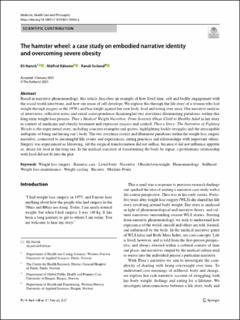The hamster wheel: a case study on embodied narrative identity and overcoming severe obesity
Journal article, Peer reviewed
Published version

Åpne
Permanent lenke
https://hdl.handle.net/11250/2739533Utgivelsesdato
2021Metadata
Vis full innførselSamlinger
Sammendrag
Based in narrative phenomenology, this article describes an example of how lived time, self and bodily engagement with the social world intertwine, and how our sense of self develops. We explore this through the life story of a woman who lost weight through surgery in the 1970 s and has fought against her own body, food and eating ever since. Our narrative analysis of interviews, reflective notes and email correspondence disentangled two storylines illuminating paradoxes within this long-term weight loss process. Thea’s Medical Weight Narrative: From Severely Obese Child to Healthy Adult is her story in context of medicine and obesity treatment and expresses success and control. Thea’s Story: The Narrative of Fighting Weight is the experiential story, including concrete examples and quotes, highlighting bodily struggles and the inescapable ambiguity of being and having one’s body. The two storylines coexist and illuminate paradoxes within the weight loss surgery narrative, connected to meaningful life events and experiences, eating practices and relationships with important others. Surgery was experienced as lifesaving, yet the surgical transformation did not suffice, because it did not influence appetite or, desire for food in the long run. In the medical narrative of transforming the body by repair, a problematic relationship with food did not fit into the plot.
